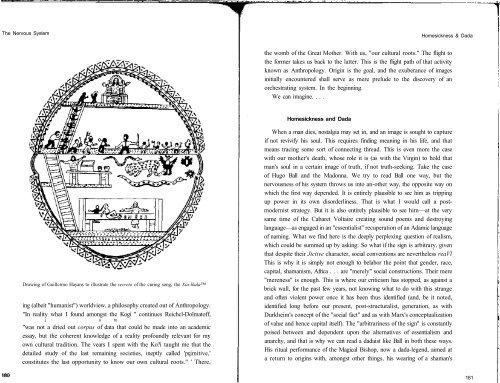The Nervous System - Department of English and Comparative ...
The Nervous System - Department of English and Comparative ...
The Nervous System - Department of English and Comparative ...
You also want an ePaper? Increase the reach of your titles
YUMPU automatically turns print PDFs into web optimized ePapers that Google loves.
<strong>The</strong> <strong>Nervous</strong> <strong>System</strong><br />
Homesickness & Dada<br />
the womb <strong>of</strong> the Great Mother. With us, "our cultural roots." <strong>The</strong> flight to<br />
the former takes us back to the latter. This is the flight path <strong>of</strong> that activity<br />
known as Anthropology. Origin is the goal, <strong>and</strong> the exuberance <strong>of</strong> images<br />
initially encountered shall serve as mere prelude to the discovery <strong>of</strong> an<br />
orchestrating system. In the beginning.<br />
We can imagine. . . .<br />
Homesickness <strong>and</strong> Dada<br />
Drawing <strong>of</strong> Guillcrmo Hayans to illustrate the secreto <strong>of</strong> the curing song, the Xia-lkala<br />
ing (albeit "humanist") worldview, a philosophy created out <strong>of</strong> Anthropology.<br />
"In reality what I found amongst the Kogi " continues Reichcl-Dolmat<strong>of</strong>f,<br />
j o to ' '<br />
"was not a dried out corpus <strong>of</strong> data that could be made into an academic<br />
essay, but the coherent knowledge <strong>of</strong> a reality pr<strong>of</strong>oundly relevant for my<br />
own cultural tradition. <strong>The</strong> vears I spent with the Ko?i taught me that the<br />
detailed study <strong>of</strong> the last remaining societies, ineptly called 'primitive,'<br />
constitutes the last opportunity to know our own cultural roots." ' <strong>The</strong>re,<br />
When a man dies, nostalgia may set in, <strong>and</strong> an image is sought to capture<br />
if not revivify his soul. This requires finding meaning in his life, <strong>and</strong> that<br />
means tracing some sort <strong>of</strong> connecting thread. This is even more the case<br />
with our mother's death, whose role it is (as with the Virgin) to hold that<br />
man's soul in a certain image <strong>of</strong> truth, if not truth-seeking. Take the case<br />
<strong>of</strong> Hugo Ball <strong>and</strong> the Madonna. We try to read Ball one way, but the<br />
nervousness <strong>of</strong> his system throws us into an-other way, the opposite way on<br />
which the first way depended. It is entirely plausible to see him as tripping<br />
up power in its own disorderliness. That is what I would call a postmodernist<br />
strategy. But it is also entirely plausible to see him—at the very<br />
same time <strong>of</strong> the Cabaret Voltaire creating sound poems <strong>and</strong> destroying<br />
language—as engaged in an "essentialist" recuperation <strong>of</strong> an Adamic language<br />
<strong>of</strong> naming. What we find here is the deeply perplexing question <strong>of</strong> realism,<br />
which could be summed up by asking: So what if the sign is arbitrary, given<br />
that despite their Jictive character, social conventions are nevertheless reaVl<br />
This is why it is simply not enough to belabor the point that gender, race,<br />
capital, shamanism, Africa . . . are "merely" social constructions. <strong>The</strong>ir mere<br />
"mereness" is enough. This is where our criticism has stopped, as against a<br />
brick wall, for the past few years, not knowing what to do with this strange<br />
<strong>and</strong> <strong>of</strong>ten violent power once it has been thus identified (<strong>and</strong>, be it noted,<br />
identified long before our present, post-structuralist, generation, as with<br />
Durkheim's concept <strong>of</strong> the "social fact" <strong>and</strong> as with Marx's conceptualization<br />
<strong>of</strong> value <strong>and</strong> hence capital itself). <strong>The</strong> "arbitrariness <strong>of</strong> the sign" is constantly<br />
poised between <strong>and</strong> dependent upon the alternatives <strong>of</strong> essentialism <strong>and</strong><br />
anarchy, <strong>and</strong> that is why we can read a dadaist like Ball in both these ways.<br />
His ritual performance <strong>of</strong> the Magical Bishop, now a dada-legend, aimed at<br />
a return to origins with, amongst other things, his wearing <strong>of</strong> a shaman's<br />
181
















